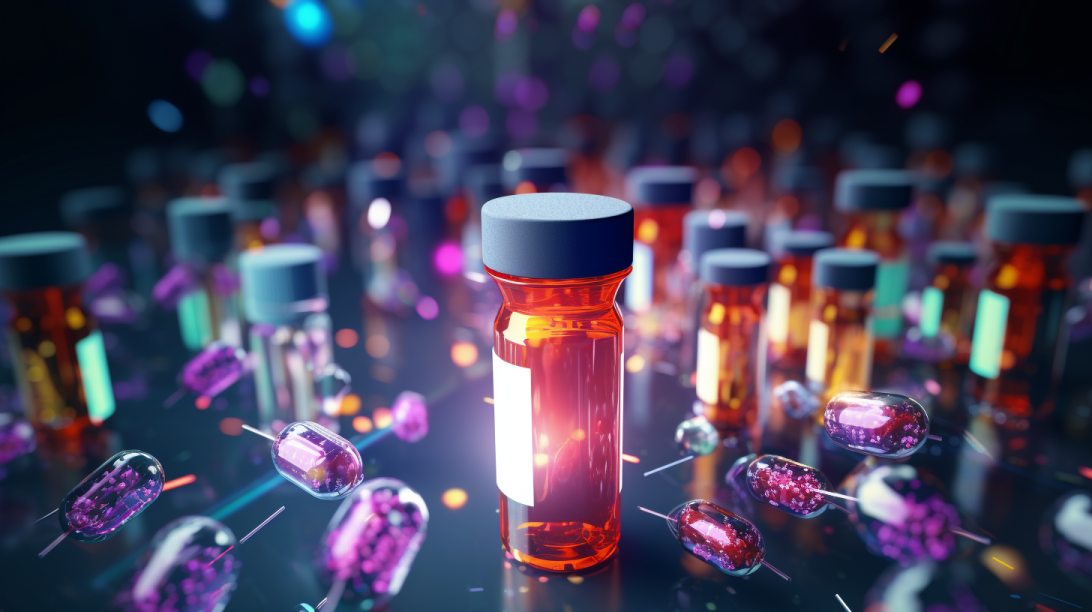Photo was created by Webthat using MidJourney
In a world plagued by the slow pace of drug development, a beacon of hope emerges from the realm of artificial intelligence. It’s a race against time, a battle to outpace the relentless march of drug-resistant diseases. The dawn of AI-discovered drugs is upon us, promising a swifter journey from lab to market, and with it, a chance to save countless lives.
The Odyssey of AI-Discovered Drugs
Recalling the chilling AI villain HAL from “2001: A Space Odyssey,” we find that AI’s true power lies not in malevolence, but in combating a different kind of threat – bacteria. In a remarkable feat, researchers at the Massachusetts Institute of Technology harnessed artificial intelligence to unearth halicin, an antibiotic named in homage to the iconic AI antagonist. This discovery opens a window into the potential of AI-assisted drug development, showcasing the speed at which it can revolutionize the pharmaceutical landscape.
The Unveiling of a New Paradigm
Traditionally, the journey of drug discovery was fraught with obstacles of time, efficiency, and cost. However, the advent of AI has unveiled a new paradigm. The AI model was trained using a repository of molecules, and once attuned to identifying bacteria-killing compounds, it swiftly screened through 6,000 candidates, culminating in the birth of halicin. This breakthrough is not just about speed; it’s about tackling antibiotic-resistant superbugs, a menace that has long defied conventional methods.
The Magic of Molecular Prediction
AI’s power lies in its ability to decipher the enigmatic language of molecular structures. With AI, we transcend the realm of speculation and step into a world where identifying a molecule’s properties is a reality. Regina Barzilay, an AI and health expert at MIT, emphasizes the potency of AI in discerning a molecule’s functions. This ability is a keystone in the accelerated drug discovery process.
Breaking Free from the Void
The pharmaceutical world once languished in a “discovery void,” where progress waned and hope dimmed. The emergence of AI breathes new life into drug development. With the specter of drug-resistant diseases haunting humanity, the need for swift action becomes paramount. AI’s analytical prowess allows us to dissect vast medical datasets, catalyzing the creation of novel drugs. This groundbreaking shift holds the potential to mend a stagnating industry.
AI: The Catalyst for Change
While AI isn’t a silver bullet, it’s a catalyst for change. It navigates the complex landscape of molecular science, enhancing human capability. It’s akin to turning scientists into superhumans, empowering them to explore, experiment, and innovate at unprecedented speeds. Chris Gibson, CEO of Recursion, likens AI’s role to enhancing scientists’ abilities, much like the transition from handmade automobiles to assembly line production.
From Fiction to Reality: The Evolution of AI in Medicine
AI’s journey in medicine began long before its popularization. From Stanford’s pioneering attempts in the 1960s to today’s AI-driven breakthroughs, the evolution has been remarkable. DeepMind’s Alphafold, a protein structure prediction tool, stands as a watershed moment, fundamentally transforming biology’s understanding. The trajectory of AI in medicine is marked by a steady ascent, culminating in recent advancements that have rewritten the rules of drug discovery.
AI’s Limitations: The Human Touch Still Vital
Despite its prowess, AI isn’t infallible. The drug development journey is a multifaceted process, requiring both human ingenuity and AI’s computational might. The marriage of AI’s standardized datasets with human expertise brings us to the cusp of a revolution. AI is a tool, not a replacement, and as it matures, it will work hand in hand with human researchers, expediting discoveries and steering us toward a future where drug development is swifter, smarter, and more efficient.
Charting the Unknown: A Future Powered by AI
In the grand tapestry of medicine, AI is still finding its place. The future promises to be a dynamic fusion of AI’s analytical precision and human adaptability. As the CEO of Insilico Medicine, Alex Zhavoronkov, observes, we’re on the brink of a new era, where AI-generated drugs are set to redefine medical horizons. However, trust remains a vital factor in AI’s integration, especially in safety-critical domains like healthcare. The potential is vast, the possibilities endless – AI is poised to mold the future of medicine.
Bridging the Void: A Message of Hope
In a world grappling with drug-resistant diseases, AI is our bridge over the abyss. With billions of data points and an ever-growing reservoir of knowledge, AI strides boldly where human capabilities alone fall short. A future where diseases meet their match and medications are tailored with unprecedented precision draws closer. As we navigate this uncharted territory, AI is our ally, our guide, and our beacon of hope.


